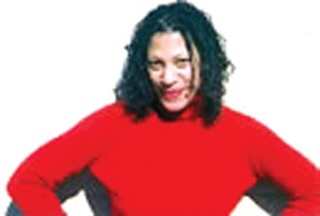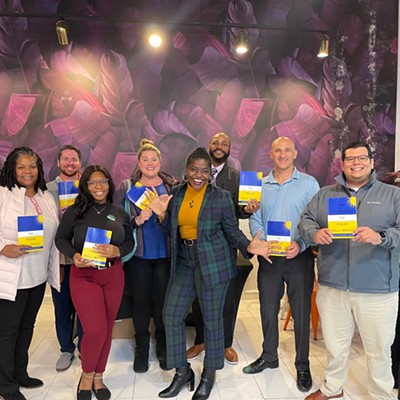The First Annual Savannah Book Festival this Saturday is bringing a wide-ranging lineup of national, regional, and local authors to town for appearances, among them John Berendt, William C. Harris Jr., Mary Kay Andrews, and many more.
One of the most well-regarded authors to appear will be Macon, Ga., native Tina McElroy Ansa, who has a new novel, Taking After Mudear, a sequel to her successful novel Ugly Ways.
Ansa spoke to us from her longtime home on St. Simons Island, Ga.
Most people might expect you to live in Atlanta, the South’s center of African American culture and power. But instead you chose to live on St. Simons. I’m intrigued by that choice and wanted to hear more about how you came to that decision.
Tina McElroy Ansa: Growing up in Georgia, the places on the coast were the most inviting and accepting for African Americans. One was American Beach in Florida, which when I was growing up was a thriving African American community. And there was Tybee in Savannah, which was sort of the “black beach,” as black people in Savannah called it. And for school trips we went to Jekyll Island.
I had never been on St. Simons in all the years I lived in Georgia. I was living in Atlanta at the time, about to get married, and my husband and I had only a brief time for a honeymoon. Someone had just been to the King and Prince Hotel with her boyfriend, and said, “You have to go to St. Simons.”
I remember coming across the causeway, and I actually heard a voice that said, “This is where you belong.” I’d never had an experience like that before in my life. I really sort of looked to the radio to see if Id’ really heard this voice.
I grew up in middle Georgia with an old muddy river running through it, so I didn’t grow up around water, but the place really spoke to me. Not just because of the physical beauty, but the spirits of my people are so alive here. The folks who lived and worked on the cotton and rice plantations, they spoke to me then and speak to me now.
It’s a physically beautiful place, but also it’s been very accepting of my husband and me as artists and as Southerners. My husband’s from Brooklyn, but as I tell people, “I beat all the North out of him” (laughs). And it’s been an extraordinary place for my writing. I’m a real Southerner, I write about the South and Southerners and a sense of place and belonging, and finding your way and spirituality. And all that just seems to hang in the air on St. Simons Island.
It’s interesting that despite the divisive media narrative, black and white Southerners actually have a lot of shared culture.
Tina McElroy Ansa: I always assumed people generally understood that. You know, country food, sense of place, family. Even if you look at the logistics of things, in the ‘50s or ‘60s neighborhoods overlapped. There’s a commonality in the South that you didn’t find in other parts of the country.
People have said, especially black people, have said, well, I’d rather live in the South where you kind of know this person is a racist, rather than in the North where people pretend racism doesn’t exist, and people are phony about it. To me there are lots of things in the South that are recommended for people to live there, especially the quality of life.
Are you put under a lot marketing pressure to pigeonhole yourself as specifically an African American author?
Tina McElroy Ansa: I think pigeonholing anything makes it easier for marketing and for certain people. So I would not automatically identify myself as an African American Southern woman writer, though I am those things. I see myself as a writer, an opinion shaper, and a creative artist. I’d like to be seen as a fine writer, quite frankly. That would suit me just fine.
So how was Madison Prickett able to rope you into the festival?
Tina McElroy Ansa: (laughs) I’m a real supporter of literature festivals in general. You want to talk about marketing, you couldn’t ask for anything more than to go somewhere and everybody there is a lover of the word. These are my people! You’re not going to be at a literary festival if you’re not interested in words, stories, ideas and those kinds of things.
And I think Savannah’s a fascinating city and a good place to have a literary festival. It’s kind of interesting that there hasn’t been one before. So he didn’t have to much roping (laughs).
Not only do you have a new novel out, Taking After Mudear, you’re also heading up your own new publishing house, DownSouth Press. Why did you take the plunge into publishing last year?
Tina McElroy Ansa: It’s very interesting when you put on a new hat. I’m a very solitary person. I love the idea of writing because it’s just me and my computer for a long time, even before it’s me and my editor. I like the solitary life, I love birds, I like to garden, I like to walk on the beach, just being with my husband. And writing fits in so well with that.
What I noticed in the last four or five years is word was getting back to me from colleagues, writers and people in the publishing business about how much the landscape has changed for African American writers. I was getting phone calls from readers and fans saying “When are you going to write something else, there’s really nothing for us to read out there.”
And the other thing is I was getting phone calls from my fellow sister writers saying, it’s getting harder and harder to get a book contract for an African American writer who is writing literature. The emphasis has really shifted, where instead of a wide range like mysteries, literary fiction and pop fiction and memoirs and spriticiualtiy books, it’s changed to “ghetto fiction,” or “urban lit.” You know, “Baby Mama Drama” sorts of things.
If you go to a Barnes and Noble you’ll see “girls” spelled with a “Z” and Pimps and the Hos Who Love Them. And these things right next to James Baldwin, and Toni Morrison and Tina McElroy Ansa, and they all say “African American Fiction.” That really started disturbing me – and the market will bear what the market will bear, that’s fine – but this shouldn’t be the only thing that’s published.
Mainstream publishers in the last four or five years were saying, “Oh, the story’s involving and the writing is beautiful, but you know the market is soft right now for African American literary fiction. Do you have something that’s a little more street, more urban?”
And that became disturbing because our literature – as human beings – reflects how we’re seen in the world. And it’s important for me that African American people are seen as full, whole, rounded human beings, not just people who live in an urban area, not just people who are interested in bling and all that. Not just folks who read “erotica,” but who read about families, and children, the whole spectrum.
So I decided a small publishing company would be a good way to contribute to this whole landscape. I’m not in competition with the big boys or the big girls, we’re not going to publish more than 10-12 books a year. We’ll keep those books in print, we’ll work to publish fine works, fiction and nonfiction, good solid, well-written and well-told stories. And to really cherish and support the writer in any way we can.
So your company is publishing Taking After Mudear.
Tina McElroy Ansa: For the first list, it made sense for me to use the positive resources I had. And the biggest resource I had, quite frankly, was Tina McElroy Ansa. And so I’m the lead title for our first list, with the aim for each list being to publish an established writer and an emerging writer. The established writer gives validity to the emerging writer, and the new writer brings new readers to the established writer.
I’ve heard for years that society’s going in a post-literary direction, with more dependence on images. But with the internet, e-mail, and texting, I actually see young people being a lot more involved with the printed word that I was at their age. What do you think?
Tina McElroy Ansa: I agree. The biggest thing is communication. Young people are looking to connect in ways we never really explored. Today we live in a time that’s very disconnected. People don’t sit at the dinner table together. There are so many more divorces, and people don’t live in one city or house their whole lives. People are looking for ways to connect.
In the last 30 or 40 years we sort of looked at that as something that would be a problem in the future, and had no idea that we were going to solve it in this way. Even texting is a way of communication with words. It’s very unexpected. It’s something that would surprise people who were trying to predict what the next new wave would be. 
Tina McElroy Ansa will appear 1 p.m. Saturday Feb. 1 at Trinity United Methodist Church as part of the Savannah Book Festival. Her newest novel, Taking After Mudear, is available from DownSouth Publishing.





























